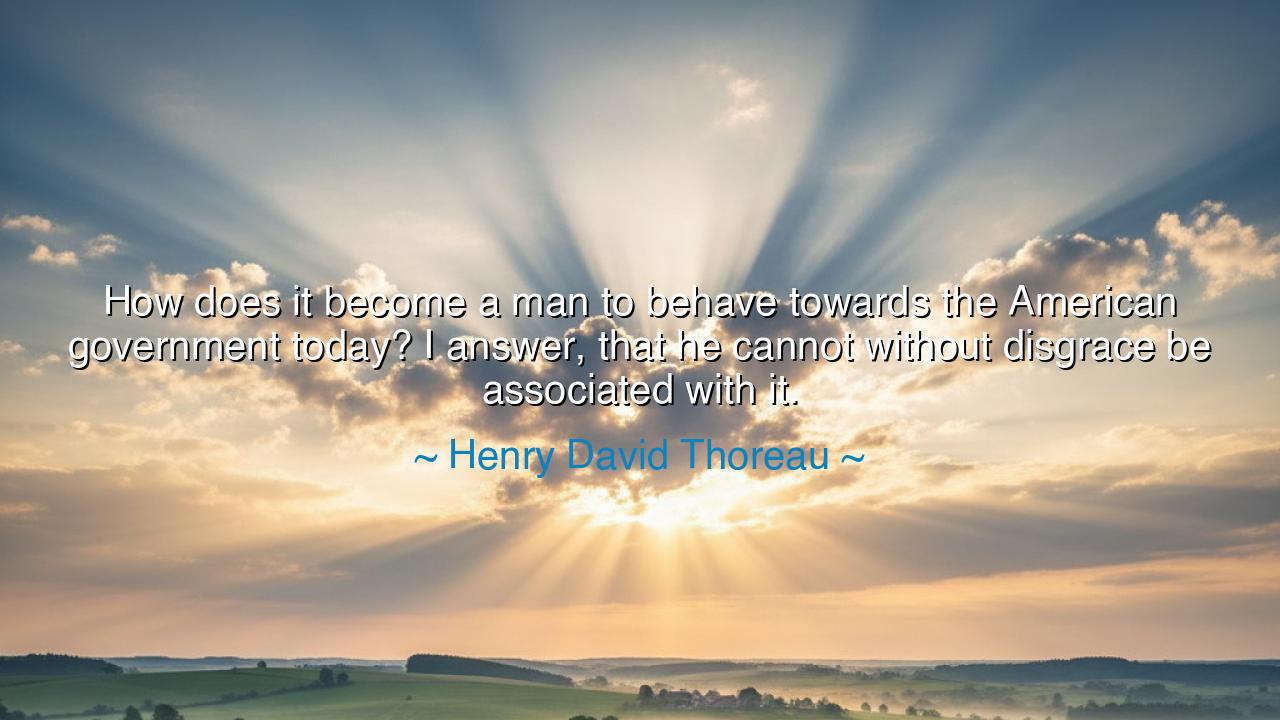
How does it become a man to behave towards the American
How does it become a man to behave towards the American government today? I answer, that he cannot without disgrace be associated with it.






"How does it become a man to behave towards the American government today? I answer, that he cannot without disgrace be associated with it." — Henry David Thoreau
Hear now the words of Henry David Thoreau, a man who stood like an oak in a storm, unbending before the winds of injustice. His question was not a light one, nor spoken in anger alone—it was born from the depths of conscience. When Thoreau asked, “How does it become a man to behave towards the American government today?” he spoke as one witnessing his nation’s betrayal of its own ideals. In his time, slavery still darkened the land, and war raged in Mexico, fought for conquest and greed. He saw a government that preached liberty while practicing oppression. And so he declared, with calm fire, that to be associated with it was to share its shame.
Thoreau’s words sprang from the soil of resistance. In 1846, he refused to pay the poll tax that funded the war against Mexico and the perpetuation of slavery. For this act of conscience, he was imprisoned for a night—a brief confinement that became eternal in its echo. From that experience was born his essay, “Civil Disobedience,” the wellspring of this quote. It was there he proclaimed that when a government becomes unjust, the duty of the just is not obedience, but defiance. “Under a government which imprisons any unjustly,” he wrote, “the true place for a just man is also a prison.” He taught that conscience must stand above law, for laws are only as moral as the hands that write them.
In his time, many sought comfort in silence, telling themselves that one man’s voice could not matter. But Thoreau stood as the eternal rebuke to such cowardice. He knew that evil thrives not merely through the actions of the wicked, but through the inaction of the good. To associate with injustice, even passively, is to give it strength. His refusal was not hatred of his country—it was love in its highest form. For true patriotism does not flatter a nation’s sins; it calls her to repentance. His disgrace, he said, would not come from rebellion, but from compliance with evil.
History offers many mirrors of his courage. Think of Mahatma Gandhi, who read Thoreau’s words and found in them the seed of India’s peaceful revolution. Think of Martin Luther King Jr., who echoed Thoreau’s spirit when he sat in a Birmingham jail, declaring that “one has a moral responsibility to disobey unjust laws.” These men did not seek chaos—they sought truth. They understood, as Thoreau did, that obedience to conscience is higher than obedience to power. Theirs was not rebellion for pride’s sake, but resistance born of moral duty. And it was through such resistance that nations awoke from their sleep.
Thoreau’s warning is timeless. He reminds us that no government is pure, and that loyalty to justice must outweigh loyalty to institutions. When the state demands that we abandon our conscience—when it oppresses the poor, wages unjust wars, or silences truth—it is then, he said, that association becomes disgrace. To go along, to turn away, to shrug and say “it is not my concern,” is to let the fire of moral courage die in our hearts. The world does not fall to tyranny all at once; it decays slowly, through the small compromises of many who know better but do nothing.
Yet his message is not one of despair, but of awakening. Thoreau believed in the power of one soul standing firm. He believed that the conscience of a single person could shake the pillars of empire. When he refused his tax, he did not imagine he was changing the world—but his act, simple and pure, lit a torch that others would carry for centuries. His life teaches that the measure of a person is not in their comfort, but in their courage to say “No” when silence is sin. To live without disgrace, he tells us, is to live in accordance with truth, even if it costs us peace, safety, or favor.
So, my children of conscience, take this lesson to heart: never let your hands be used to build what your soul knows to be wrong. Question the powers that govern you. Hold your leaders to the light of justice, and do not fear to stand alone if truth demands it. Remember that association is not loyalty, and that obedience is not virtue when it serves injustice. Be like Thoreau—firm, humble, and unafraid. For though governments may falter, the spirit of integrity endures. The world changes not when power commands it, but when conscience refuses to bow.






AAdministratorAdministrator
Welcome, honored guests. Please leave a comment, we will respond soon